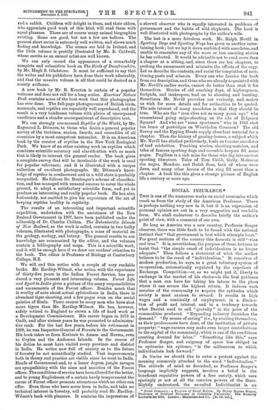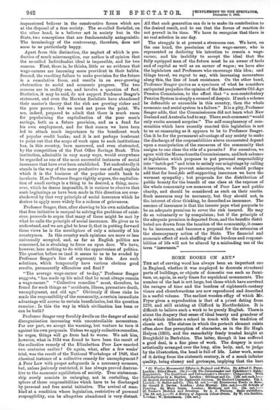SOCIAL INSURANCE.* Tam is one of the numerous works on
social economics which reach us from the study of the American Professor. There is perhaps nothing very new in it, but it is an expression of personal opinion set out in a very suggestive and readable form, We shall endeavour to describe briefly the author's point of view, with a comment of our own.
So long as America was a new country, Professor Seager observes, there was little fault to be found with the national instinct that "that government is best which attempts least." For great sections of the country this formula is still "wise and true." It is, nevertheless, the purpose of these lectures to insist that "the simple creed of individualism is no longer adequate." Then follows a statement of what the author believes to be the creed of "individualism." It conceives of modern production, he says, as a great voluntary system of co-operation, automatically regulated by the expedient of Exchange. Competition—or, as we might put it, liberty to exchange in the market of his choice—is the best guidance that a man can have for taking his labour to the place where it can secure the highest return. It induces each member of the community to acquire the aptitudes which society is most anxious to reward. It results in high wages and a continuity of employment, in a diminu- tion of profit and interest, and in a tendency towards what Bastiat used to call " gratuity " in the price of the commodities produced. "Expanding industry furnishes the demand." "By means of saving" (i.e., by availing themselves, as their predecessors have done, of the institution of private property) "wage-earners may make even larger contributions to the capital of the community, which is one of the conditions creating demand for labor." "Something like this," says Professor Seager, and exigency of space has obliged us to epitomise his epitome, "is the millennium to which individualists look forward."
In limine we should like to enter a protest against the meaning commonly attached to the word "Individualism." The attitude of mind so described, as Professor Seager's language implicitly suggests, involves a belief in the beneficent regulative powers of a free society, which uses sparingly or not at all the coercive powers of the State. Rightly understood, the so-called Individualist is an • Social Insurance : a Pro pant of Social &form. By Henry Rogers Seeger, Professor of Political Economy in Columbia University. The Kennedy Lectures for 1910. London: iff.Pmillan and Co. De. 6d. net.1.,
impassioned believer in the constructive forces which are at the disposal of a free society. The so-called Socialist, on the other hand, is a believer not in society but in the State, two conceptions that are fundamentally antagonistic. The terminology of the controversy, therefore, does not seem to us particularly happy.
Apart from this distinction, the neglect of which is pro- ductive of much misconception, our author is of opinion that the so-called Individualist ideal is impossible, and for two reasons. First, there is, he thinks, little or no evidence that wage-earners are becoming more provident in their habits. Second, the reselling failure to make provision for the future is a cumulative force, and results in an ever-growing obstruction to social and economic progress. The two reasons are in reality one, and involve a question of fact. Statistics, it may be said, do not support Professor Seager's statement, and even the Marxian Socialists have abandoned their master's theory that the rich are growing richer and the poor poorer; but we need not press the point. We are, indeed, prepared to admit that there is much room for popularising the capitalisation of the poor man's savings, both as a future provision, and as a fund for his own employment, and for that reason we have been led to attach much importance to the beneficent work of popular credit banks; and it is not perhaps irrelevant to point out that the scope of work open to such institutions has, in this country, been narrowed, and even obstructed, by the competition of the Post Office Savings Bank. This institution, admirable in very many ways, would everywhere be regarded as one of the most successful instances of social insurance that have ever been established. Yet undoubtedly it stands in the way of the more productive use of small capitals which it is the business of the popular credit bank to inculcate. If, as Professor Seager rightly argues, the capitalisa- tion of small savings is a thing to be desired, a thing, more- over, which he deems impossible, it is curious to observe that such beginnings as have been made in this direction are over- shadowed by that very principle of social insurance which he desires to apply more widely for a redress of grievances.
Professor Seeger, then, after showing to his own satisfaction that free initiative is unequal to solving the problems of exist- ence, proceeds to argue that many of these might be met by what he calls the principle of social insurance. He gives us to understand, and we are glad to hear it, that in putting forward these views he is the mouthpiece of only a minority of his countrymen. In this country such opinions are more or less universally accepted, and, as far as English politics are concerned, he is straining to force an open door. We have, however, here nothing to do with the opportunism of politics. The question before us (and it seems to us to be evaded by Professor Seager's line of argument) is this. Are such solutions, which temporarily have various obvious good results, permanently efficacious and final ?
"The average wage-earner of to-day," Professor Seager suggests, "has made up his mind that he must always remain a wage-earner." "Collective remedies" must, therefore, be found for such things as "accidents, illness, premature death, unemployment, and old age." Obviously if these risks he made the responsibility of the community, a certain immediate advantage will accrue to certain beneficiaries, but the question remains : Is this the way in which civilisation has been or can be built ?
Professor Seager very forcibly dwells on the danger of social disorganisation increasing with uncontrollable momentum. For our part, we accept the warning, but venture to turn it against his own proposals. Unless we apply collective remedies, he urges, things will go from bad to worse. We ask him, however, what in 1834 was found to have been the result of the collective remedy of the Elizabethan Poor Law enacted two centuries earlier ? Or again, what, after a few weeks' trial, was the result of the National Workshops of 1848, that classical instance of a collective remedy for unemployment ? A Poor Law with proper safeguards is a necessary measure,
but, unless jealously restricted, it has always proved destruc- tive to the economic equilibrium of society. True statesman- ship surely consists in enlarging, not in curtailing, the sphere of those responsibilities which have to be discharged by personal and free social initiative. The arrival of man- kind at a condition where legislation, restrictive of personal responsibility, can be altogether abandoned is very distant.
All that each generation can do is to make its contribution to the desired result, and to see that the forces of reaction do not prevail in its time. We have to recognise that there is no real solution in our day.
The struggle is at present a strenuous one. We have, on the one hand, the pessimism of the wage-earner, who is represented as declaring his intention to remain a wage- earner, and his inability to accept the ideal that the fully equipped man of the future must be an owner of tools and of capital as well as an earner of wages ; we have also the legislators and Professors who encourage this idea; and things travel, we regret to say, with increasing momentum along this, the line of least resistance. On the other hand, Professor Seager quotes as a specimen of what he considers antiquated prejudice the opinion of the Massachusetts Old-Age Pension Commission, to the effect that "a non-contributory Pension System is simply a counsel of despair. If such a scheme be defensible or excusable in this country, then the whole economic and social system is a failure." It is a pity, Professor Seager adds, that the Commissioners did not learn what New Zealand and Australia had to say. There such comment "would only excite amused surprise." The sell-complacency of com- munities which have recently enacted this legislation is not to us so reassuring as it appears to be to Professor Seager. Can it be for the permanent advantage of any society to make the discharge of the responsibilities above enumerated depend upon a manipulation of the resources of the community that assigns to one class the role of a parasite? For ourselves, we agree with the Massachusetts Commissioners, and look askance at legislation which proposes to put personal responsibility into " hotch-pot " and tries to satisfy our misgivings by calling it insurance. To prevent misconception, we should perhaps add that for bond-fide self-supporting insurance we have the warmest sympathy ; but proposals for the distribution of public bounty for the benefit of one class at the expense of the whole community are measures of Poor Law and public charity, and should be considered as such on their merits. Such measures may be necessary, but they should not, in the interest of clear thinking, be described as insurance. The essence of insurance is that the insurer pays what purports to be an adequate premium to cover the risk insured. He may do so voluntarily or by compulsion ; but if the principle of the adequate premium is departed from, and the benefits distri• buted are drawn from the taxation of the community, it ceases to be insurance, and becomes a proposal for the extension ol the eleemosynary action of the State. The financial and economic effect of such shuffling of the burdens and responsi- bilities of life will not be altered by a misleading use of the term "insurance."











































































 Previous page
Previous page